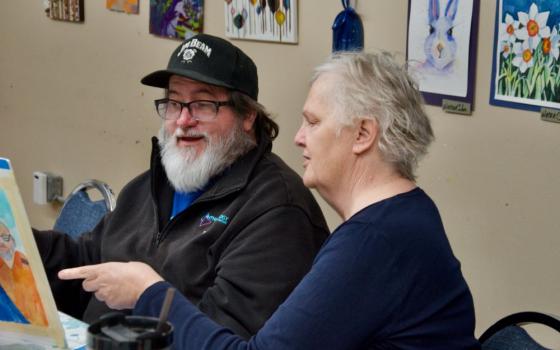
Community members are like rough stones shaken together until they become polished and gleam like gems. (Dreamstime/Ams22)

(GSR logo/Toni-Ann Ortiz)
This month, the panelists tackled some important topics in religious life as they responded to the following questions:
Do you think most religious are happy with the collaboration and support in community life? Is community meant for mission, or is community living itself a mission?
______
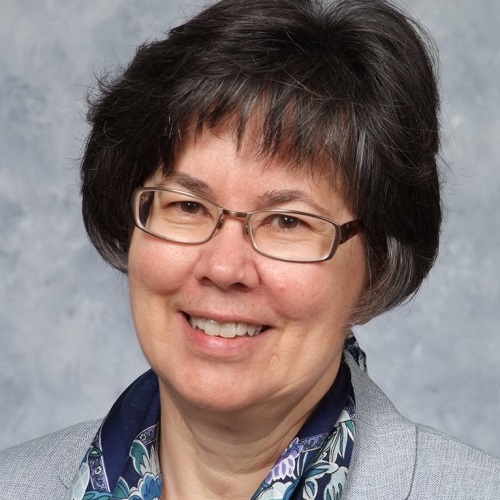 Mary Kathleen Glavich is a Sister of Notre Dame from Cleveland. In early ministries, she taught every grade from first to 12th. Later, she served as a vocation director for her diocese and as a pastoral associate in a parish. A writer and editor, she has published many articles and more than 90 books and was a featured speaker at catechetical conferences in the United Arab Emirates and Oman.
Mary Kathleen Glavich is a Sister of Notre Dame from Cleveland. In early ministries, she taught every grade from first to 12th. Later, she served as a vocation director for her diocese and as a pastoral associate in a parish. A writer and editor, she has published many articles and more than 90 books and was a featured speaker at catechetical conferences in the United Arab Emirates and Oman.
In my experience, since the Second Vatican Council, most religious have been pleased with efforts to collaborate. In my community, we frequently receive surveys and gather for meetings to discuss plans. Sisters are invited, not assigned, to participate in programs and serve on committees. After combining four provinces into one, we Sisters of Notre Dame take pains to ensure the involvement of all, especially through Zoom meetings.
In our vow formula, we pray to live our vows faithfully through "the prayers and support of my sisters." Especially during a crisis, such as an impending surgery or a death, the community rallies around the hurting sister. We encourage each other in new undertakings. And when one sister accomplishes something or receives a reward, the rest cheer.
Of course, like any family, our "family of choice" isn't perfect. What sister hasn't felt painful things like not having a say in a decision that affects her, being thwarted in her ministry, and enduring criticisms or snubs? As a Jesuit friend remarked, "All of life is a trade."
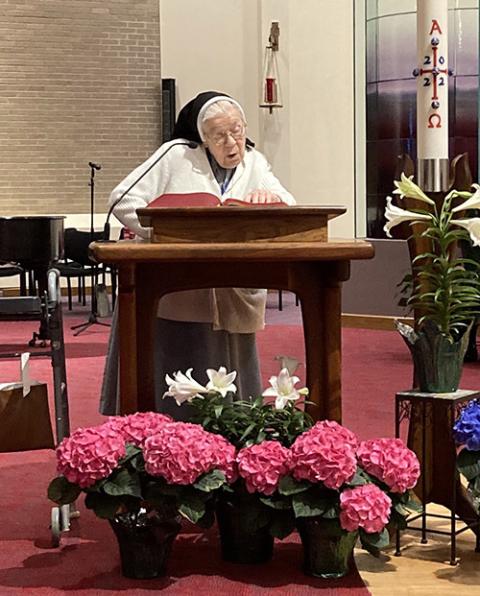
Notre Dame Sr. Marian Coughlin, 93, reads at Mass once a month. (Kathleen Glavich)
We sisters accept the inevitable crosses in community life for the joy of living with women who share the same love for God.
As for whether community is meant for mission or is community living itself a mission, the short answer is: "Both." The prologue to our constitutions states, "Consecrated for mission in the Church, we serve people." Article 3 says, "We participate in the mission of Jesus Christ, witnessing God's goodness and provident care to others."
In the United States, we carried out this mission primarily through education from preschool to college levels. Due to the dwindling number of sisters and their aging, we now have ventured more into other avenues of educating, like making corporate statements, writing, giving talks, parish work, and setting up websites.
On Holy Thursday, Jesus told his disciples to wash each other's feet. Nowadays, many of us witness God's goodness and provident care mainly to one another. Sisters who no longer minister "in the world" do foot-washing in community. They prepare our liturgies, play instruments at Mass, decorate our dining rooms for celebrations, bake cookies for our coffee breaks, and deliver our mail. Sisters take care of our finances, investments, archives and daily community emails. A team of sisters has the mission of praying with any sister in our health care facility who requests it. Two of our nonagenarian sisters volunteer as lectors, and they read loud and clear! Last but not least, a number of self-sacrificing sisters serve the community in the roles of superiors and local coordinators.
It's been said that community members are like rough stones shaken together until they become polished and gleam like gems. May this analogy prove true!
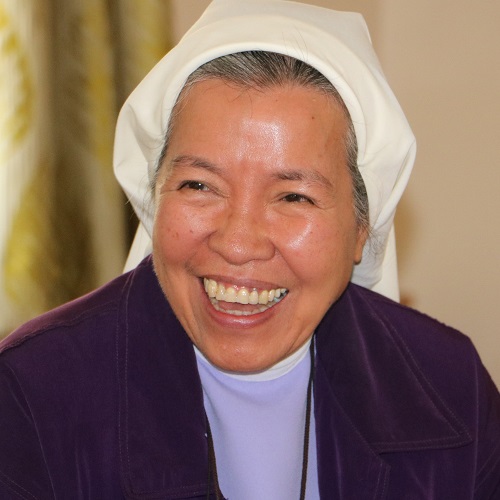 Vicenta Javier, a member of the Religious of the Assumption, is from the Philippines. After eight years of missionary work in Vietnam, she is now in her 11th year of missionary work in East Africa. She is an educator but has also been a formator of young sisters in the Philippines, Vietnam, Tanzania and Kenya. Currently, she teaches part time at the Center for Leadership and Management at Tangaza University College in Nairobi, Kenya.
Vicenta Javier, a member of the Religious of the Assumption, is from the Philippines. After eight years of missionary work in Vietnam, she is now in her 11th year of missionary work in East Africa. She is an educator but has also been a formator of young sisters in the Philippines, Vietnam, Tanzania and Kenya. Currently, she teaches part time at the Center for Leadership and Management at Tangaza University College in Nairobi, Kenya.
A parent thanked Sister Anicia for teaching her kindergartener. Little Sheryl had offered to set the table, helped Mom clean the kitchen, and brought Dad's slippers. When Mom tucked her to bed, she thanked Sheryl for being extra helpful.
Sheryl told her, "I wanted to do what Sister Anicia told us today: to make sure we do a loving act for our mom and dad each day."
What a good lesson for community living! For religious men and women who are unhappy in their communities, maybe this training to do a daily loving act for each other has been missing.
Meaningful and joyful community living does not happen automatically. Like any relationship, it needs to be nurtured and intentionally cared for and requires commitment. I attended a formation class for novices where the lecturer commented on forms we fill in with boxes for our civil status: single, married, separated, divorced, widowed.
"We tick off 'single,' but in fact, that is not what we are. The truth is we are community. Just too bad that there is no such category in those forms."
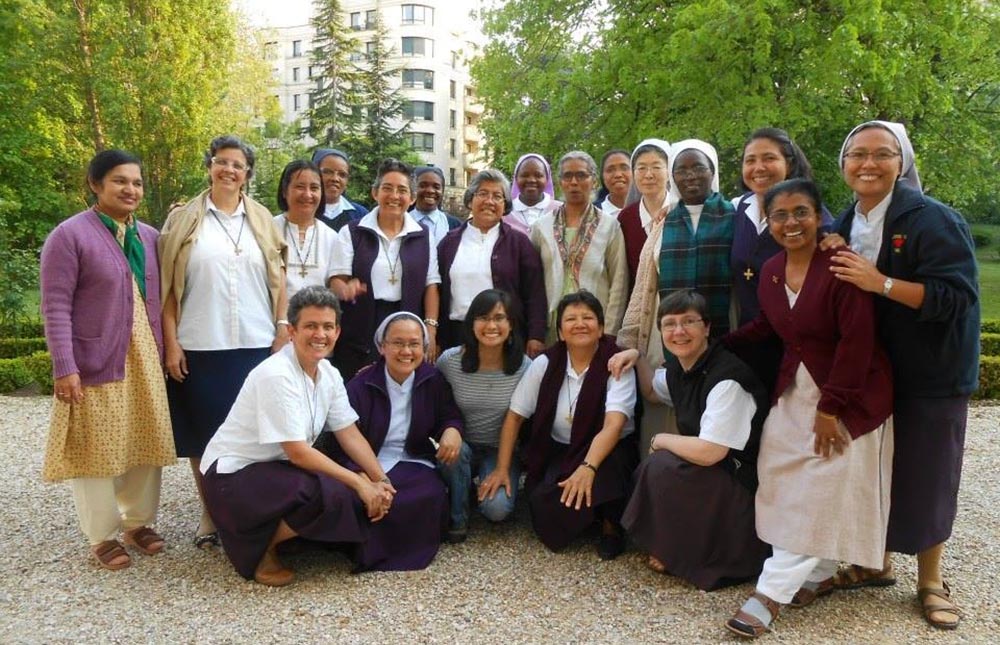
Members of several provinces of the Religious of the Assumption at their Motherhouse in Paris, collaborating in a preparation program for their final vows (Courtesy of Vicenta Javier)
If we think our capacity for community living is innate, we take it for granted, thinking it automatically happens when people live together. We can't leave intentionality and commitment to chance.
In a Worldwide Marriage Encounter weekend, the couple speaking referred to "married singles" (married people who live as if they were single: committed to no one, responsible for no one and accountable to no one). There can also be "religious singles" who have not committed themselves to their brothers and sisters in community and therefore do not find the joy that comes from it.
A line in our Rule of Life talks of community as "a school of love." Just as married couples find the holiness of perfect love in living out their family lives, so do we religious in community. There, we find the joy that comes from learning how to love and be loved. This joy in community living proclaims: See how they love one another.
As a college student, I saw the sisters take evening walks, chatting animatedly and laughing together. I felt an almost physical pain in my heart to join them, such a longing to become part of their joy at being together.
Today, I see religious men and women who are happy and committed community members, and I see others who have not made the choice and commitment to belong to their brothers and sisters. They have not learned the lessons in the "school of love." Community is mission and for mission, or, as Pope Francis says, "a communion that evangelizes."
"We tick off 'single,' but in fact, that is not what we are. The truth is we are community. Just too bad that there is no such category in those forms."
It evangelizes us as we go out of our comfort zones to serve the people in our community. Then we become community-builders and artisans of communion wherever we work: building bridges, healing divisions, reconciling broken relationships, making justice and peace flourish.
Our God is not a "divine single," but a community, a Trinity of persons. Their dream is to recreate our world into an image of their perfect communion in love. Our communities could be powerful leaven transforming our world; like ever-widening ripples, we contribute to building a community of nations, a communion with the whole of creation, with social classes, generations, cultures, tribes, ethnicities, religions.
Then truly, when our Community-God looks into the mirror of our world, they will see reflected back the communion that is meant to be on the face of the Earth.
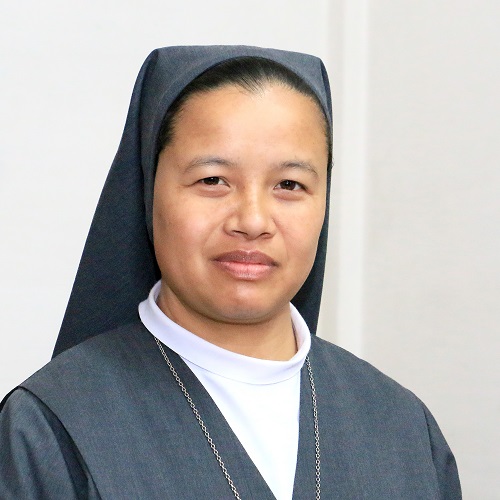 Euginia Laloo of the Jaintia tribe of Meghalaya, India, is a member of the Immaculate Heart of Mary Province (Shillong) of the Institute of the Daughters of Mary Help of Christians (Salesian Sisters of Don Bosco). With a background in media technology and English literature, she has worked in schools, especially with dropout students and in media ministry. Currently, she is writing the history of her province and serving as coordinator of social communication.
Euginia Laloo of the Jaintia tribe of Meghalaya, India, is a member of the Immaculate Heart of Mary Province (Shillong) of the Institute of the Daughters of Mary Help of Christians (Salesian Sisters of Don Bosco). With a background in media technology and English literature, she has worked in schools, especially with dropout students and in media ministry. Currently, she is writing the history of her province and serving as coordinator of social communication.
A religious community is a place where religious of the same order come together and share their life and mission. I believe God gathers individuals and places them in particular groups through our superiors. In living community life, a religious inevitably lives the cardinal virtues of faith, hope and charity in an eminent degree if she wishes to live a meaningful and fruitful life of dedication.
The union or relationship built up in community responds to the deepest need of the human heart, and at the same time, it disposes one for apostolic generosity. Just by living together in a community, one does not necessarily form "one heart and soul" with the other members of the community. Despite the years of formation and the so-called "religious life" lived by an individual for several years, we do see that most of the time, an individual tends to be guided by her own feelings and emotions.
Most religious become unhappy and grumpy when they have an idealistic image of what a community should be, forgetting that it is not just a reality of God's presence but also of human fragility.
Considering all that, the approach of each individual is the most important factor in whether she is happy with the collaboration and support in community life. I also asked this question to some other religious sisters — friends of mine — and they too expressed the same opinion.
In the words of Christopher Miller, "Low expectations are the keys to happiness in life." Most religious become unhappy and grumpy when they have an idealistic image of what a community should be, forgetting that it is not just a reality of God's presence but also of human fragility. In such cases, one expects more from the others and would not extend their hands to those most in need.
On the other hand, religious who seek to give love and support to others rather than expecting it from the others are more graceful, cheerful and find fulfillment and meaning in community living. Community, if taken in the right perspective, is indeed a place of growth and a place for free self-giving, for sincere dialogue, for liberation from selfish attachment, and, above all, for self-realization.
I feel that community and mission are two sides of the same coin. When religious live the aim of community living — namely, contemplation of God and the pursuit of Christian perfection — we cannot but go out to the world in service. God's love urges us to love our neighbor, too, and this is expressed by the variety of services (health care, education, prison ministry, evangelization, care for the aged and people with disabilities) that religious render to humankind, touching every aspect of human development.
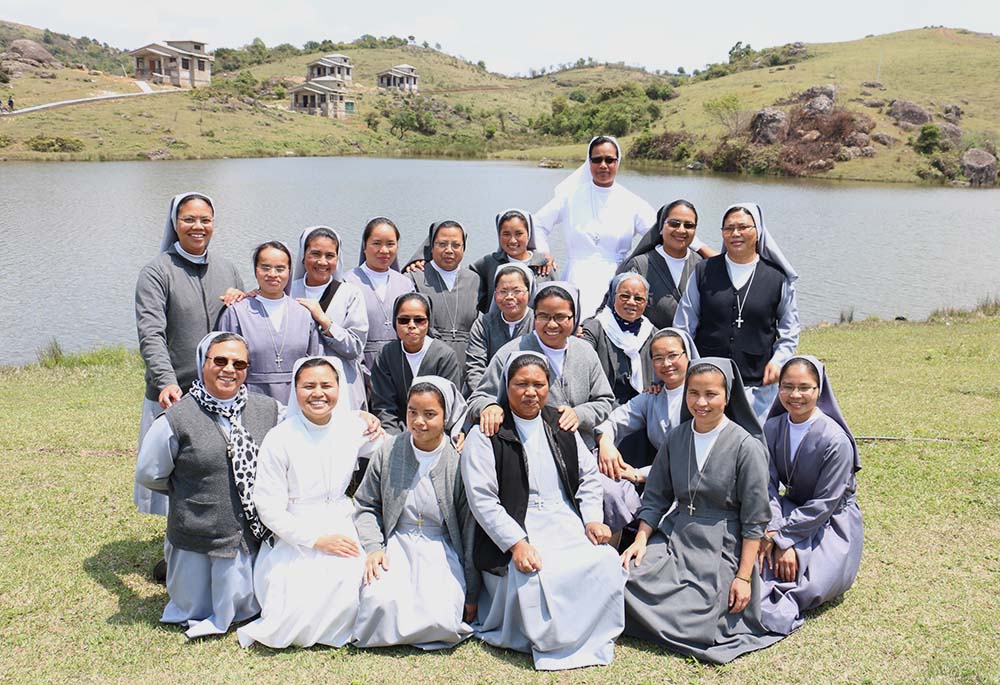
A group of our community sisters on an Easter outing on April 22, 2019, share the joy of being together. (Euginia Laloo)
In doing so, we truly witness that we are one body of Christ, spiritually connected to each other while we represent him in our varieties of religious charisms.
I like the quote from the church document "Fraternal Life in Community," which suggests "the need to undertake a path of rediscovering the intimate bond between community and mission, in order creatively to overcome unilateral tendencies, which invariably impoverish the rich reality of religious life."
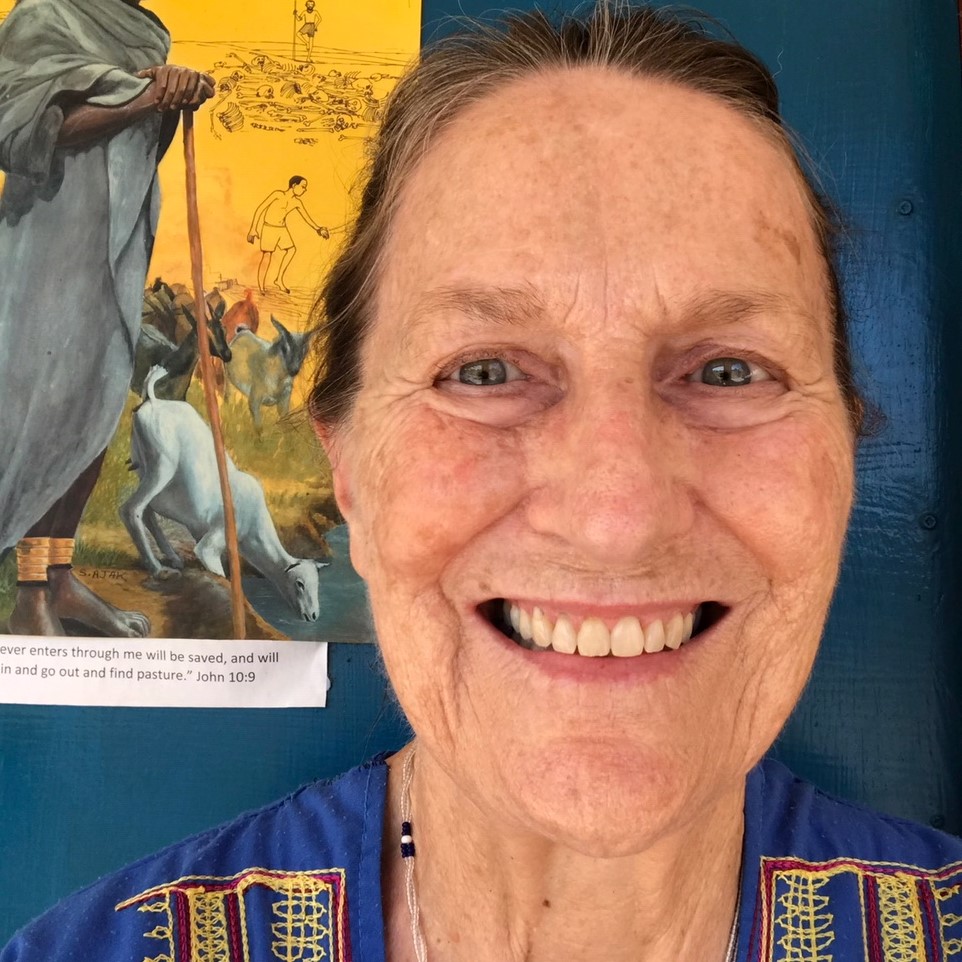 Thérèse Hope Merandi is an American-born and naturalized Brazilian Missionary Sister of the Sacred Heart of Jesus. With graduate degrees in theology and psychology, for 40 years she did formation work with various groups, including grassroots levels, in conflict areas, mostly in Latin American countries such as Nicaragua, Guatemala, Argentina, Cuba and Paraguay. She served in congregational general leadership and ministered for 20 years in African countries, including Ethiopia and Uganda. She is currently in South Sudan as part of the intercongregational pastoral team of Solidarity with South Sudan.
Thérèse Hope Merandi is an American-born and naturalized Brazilian Missionary Sister of the Sacred Heart of Jesus. With graduate degrees in theology and psychology, for 40 years she did formation work with various groups, including grassroots levels, in conflict areas, mostly in Latin American countries such as Nicaragua, Guatemala, Argentina, Cuba and Paraguay. She served in congregational general leadership and ministered for 20 years in African countries, including Ethiopia and Uganda. She is currently in South Sudan as part of the intercongregational pastoral team of Solidarity with South Sudan.
Collaboration in mission builds community, from where support comes as gift. "Mission" and "community" are meaningful and core to every consecrated religious, whose life unfolds in the embodiment of a charism, freely God-given and calling her to her wildest imagining into a mystery of Emmanuel, "God with us."
The form and structure of religious life — apostolic, missionary, contemplative, enclosed — does not matter: Collaboration and support are essential in the charismatic mission and community to which she is called and wherein she is consecrated.
The human person is a "living unity," as are the bodies we form in nations, cultures, societies, faith and church. Disjointed, awkward, at times beautiful and appealing, divisive, domineering, open, caring, perceptive and capable of growing, developing, changing — all these are aspects of the fluctuating, windblown, reality-tested life of mission and community on which religious embark and which they embrace.
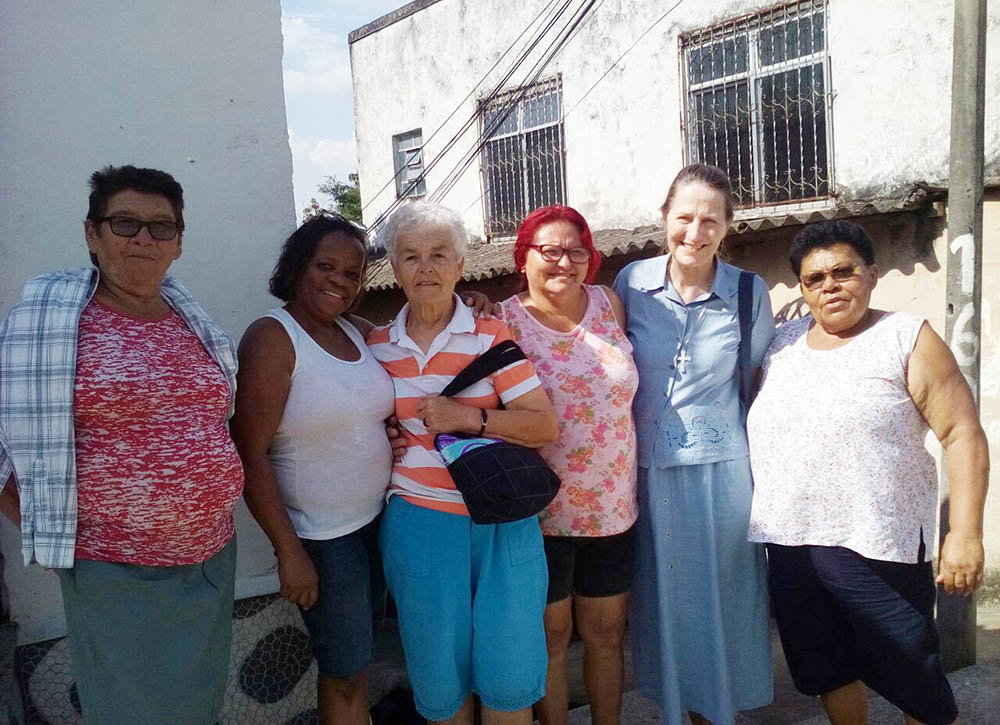
Sr. Thérèse Hope Merandi, second from right, with mothers and community workers in the base communities in Favela Chácara do Céu, Borel, Rio de Janeiro (Courtesy of Thérèse Hope Merandi)
There is no perfect mission. There is no perfect community. All is in process of coming to be, more and beyond, where the mission has reached and where the community settles. Having lived in "inserted" communities in the missions of Brazil and Ethiopia, I realize that it is the gift of becoming "vulnerable" along with the people we are called to serve that develops a growing sense of collaboration and support in community.
In the drug-trafficked favela of Borel in Rio de Janeiro, youth are the armed sellers and defenders of the drugs that flow through their hands. The buyers and the chiefs allocate the pittance of money these youths receive, earnings that usually go to supporting a fragmented family. It's an unending cycle of shootings, killings, selling drugs and raising families in this turbulent setting.
Living among and with these families, building ecclesial Christian base communities in their midst, we have given hope and light to an otherwise forgotten sector of humanity.
In Ethiopia, living with and among the Wolayta people — the forgotten, humiliated and belittled tribe of poor southwestern potters — to have a chance for water, education, health services and dignity, we have opened the doors, joining hearts and hands in collaboration and support toward growth and betterment of life.
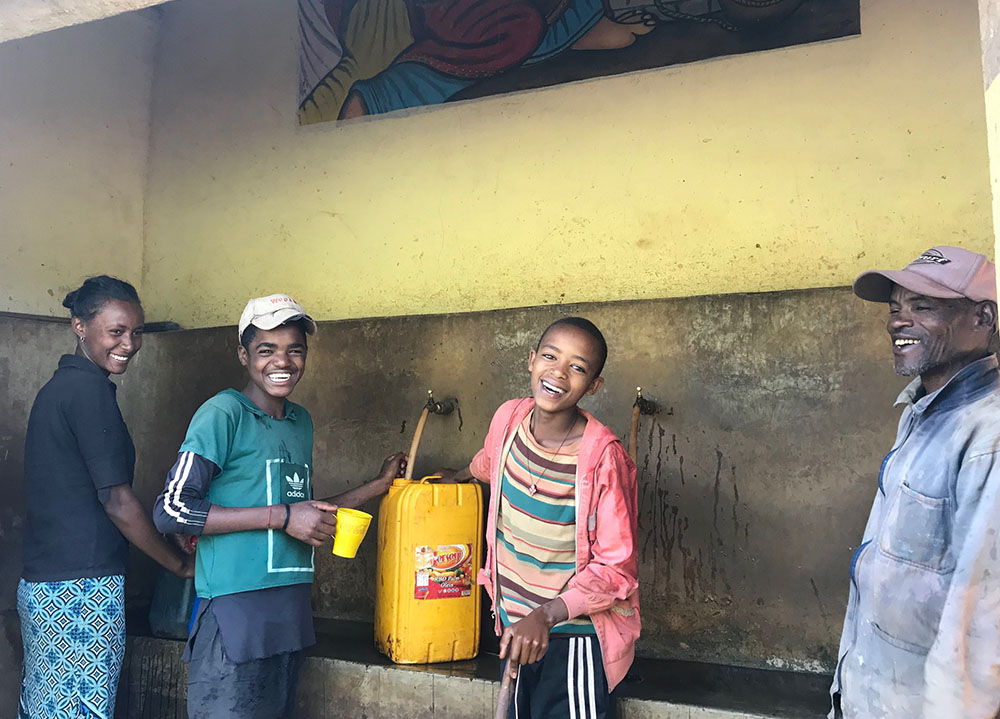
People in Ethiopia make use of a water source developed for their community. (Courtesy of Thérèse Hope Merandi)
God's calling and commitment in Jesus is "that all may have life and have it in abundance" (John 10:10). This is what fosters collaboration and support both in mission and community. In this fragile living unity — happy at times, struggling at others — the Spirit provides grace that binds members together in maturing human relationships.
In the mystery of this presence, "God with us," mission and community bear life and give witness to the Gospel. Vulnerability and inclusiveness are the secret pillars whereby a community becomes supportive and the mission, collaborative.
We need one another. Our work is together. Pope Francis summarizes it best in Evangelii Gaudium: "Being involved and supportive, bearing fruit and rejoicing" are the signs of "an evangelizing community."
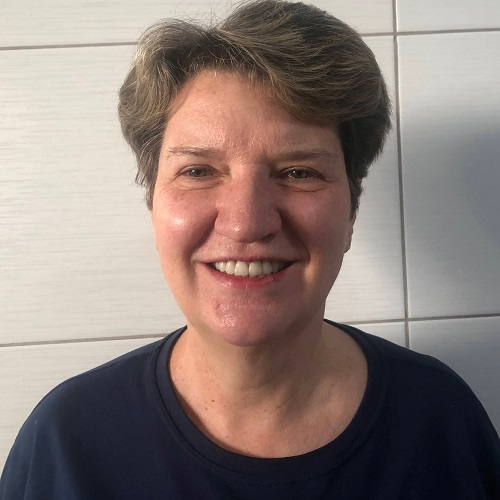 Rita Schneider is a member of the Sisters of the Immaculate Heart of Mary. She is originally from Brazil but worked for two years as a missionary in Haiti and more recently with Brazilian immigrants in the United States. She has an academic background in Portuguese, theology and sociology. Now back in Brazil, she is currently on the leadership team of her province and works on social projects with the poorest communities in south Brazil.
Rita Schneider is a member of the Sisters of the Immaculate Heart of Mary. She is originally from Brazil but worked for two years as a missionary in Haiti and more recently with Brazilian immigrants in the United States. She has an academic background in Portuguese, theology and sociology. Now back in Brazil, she is currently on the leadership team of her province and works on social projects with the poorest communities in south Brazil.
After being a missionary for almost 13 years of my religious life in the United States, I realized that religious life did not have the same meaning as here in Brazil regarding community. In the United States, it is very common for nuns to live by themselves because of jobs or other reasons, while here in Brazil, a nun not living with other nuns is rarely seen and would not be considered acceptable.
In Brazil, religious life and community life are closely linked, as if one does not exist without the other. It is almost obligatory to be together, doing tasks together, even if it is just living under the same roof. This is what many people understand community life to be.
That being the case, I wonder if most religious are happy with the collaboration and support in community life?
Advertisement
Living in community is intended for mission, and it takes great maturity to maintain the sense of community in active consecrated religious life. We are called to give voice and bear witness to a kingdom that is in itself communion, relationships, involvement, and commitment to the other, to nature and to the whole world that surrounds us.
However, this does not mean, for example, that we have to watch TV together in one room at the same time every day, as many communities still require. There are other ways of "being a community" that give much more quality to the time we are together, celebrating the mission/call/singular gift of each of us.
Like people in the secular world, consecrated religious need to survive, work, maintain themselves — and in doing so, schedules cannot always be met due to professional life. This is normal; it is life. But it results in the need for dialogue, openness and flexibility so that one can be a happy witness of communion, sorority, community.
The uneasiness that many suffer in this time of constant change results from a limited understanding of what being "community" means. We meet to recall the meaning of our calling and the joy of the proclamation of the kingdom. This transcends the other things we "must" do.
We need to integrate the work in the modern world with maintaining powerful moments together, giving witness to the world as a community of believers, which requires flexibility but also faithfulness to our ideals.



